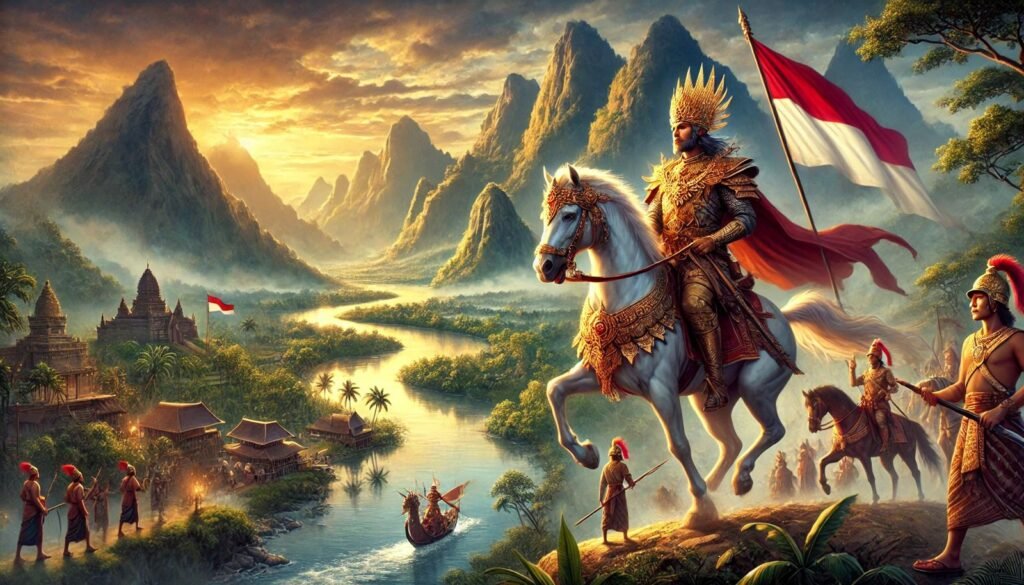By : Ngurah Sigit.
King Kertanegara was a pivotal figure in the history of the Nusantara, particularly due to the peaceful manner in which he ascended the throne and his wise leadership. As the son of King Wisnuwardhana, Kertanegara had been groomed from an early age to succeed the throne of the Singasari Kingdom. However, despite his rightful claim, Kertanegara did not exhibit excessive ambition or resort to violence to seize power, as was often the case during that era. After the death of Wisnuwardhana in 1268, Kertanegara peacefully assumed the throne as king without any power struggles, rebellions, or political intrigue. The full support of the nobles and people of Singasari reflected their trust in Kertanegara’s humble and wise character.

Even after becoming king, Kertanegara never considered himself above his people. His humility was evident in the way he led the kingdom. Kertanegara prioritized diplomacy and peaceful policies over military conquest. One of the most famous examples of his careful governance was when he launched the Pamalayu Expedition in 1275. This expedition was not a military expansion aimed at conquering other kingdoms, but a diplomatic mission to establish alliances with the Malay Kingdom in Sumatra. This move demonstrated that Kertanegara had a grand vision to unite the kingdoms of the Nusantara through friendship and diplomatic relations rather than violence.
Behind his gentle and humble nature, Kertanegara possessed great courage and dignity as a leader. This was most apparent when he faced the threat from the Yuan Dynasty in China. In 1289, Kublai Khan, the ruler of the Yuan Dynasty, sent envoys to Singasari demanding that Kertanegara recognize Yuan authority and pay tribute. However, Kertanegara firmly rejected these demands. He even humiliated the Yuan envoys, which ultimately provoked Kublai Khan’s anger. Kertanegara’s decision showed that while he preferred peaceful means, he was not afraid to defend his kingdom’s sovereignty by any means necessary.

Kertanegara was not only known as a strong king but also as a visionary leader who sought to foster unity among the kingdoms of the Nusantara. He recognized that true strength did not solely lie in military power but in political and cultural unity. His grand vision to unite the Indonesian archipelago through harmonious relations laid the foundation for many successor kingdoms, including Majapahit, which would later reach its zenith. Although he did not live to witness the full realization of this great unity due to the fall of Singasari, his legacy of policies and vision endured.
Unfortunately, Kertanegara’s reign did not end as gloriously as it began. In 1292, Singasari was attacked by Jayakatwang, the ruler of Kediri who felt marginalized by Kertanegara’s power. In this attack, Kertanegara was killed, and Singasari fell. Despite this tragic end, his humble and visionary leadership remains remembered. Even after his death, Kertanegara’s ideas of Nusantara unity inspired his successors in Majapahit, who eventually fulfilled Kertanegara’s dream of uniting the Indonesian archipelago.
King Kertanegara left an invaluable legacy for Indonesia’s history. His courage in defending sovereignty, wise diplomacy, and humble and prudent nature earned him respect not only in his time but also in the history of the Nusantara. Kertanegara’s peaceful ascension to the throne and his governance of Singasari serve as examples that great leadership is not measured solely by military strength but also by wisdom, diplomacy, and a profound respect for the people. Kertanegara’s legacy lives on in the grand narrative of Indonesia’s history, reminding us that a great leader is one who knows how to lead with heart, courage, and a grand vision for the future of his nation.
The author is a sociologist, cultural observer, and media analyst.

